Unit 11 第2课时(Section A 2a-2d) (同步课件)-七年级英语下册同步精品课堂(人教版)
文档属性
| 名称 | Unit 11 第2课时(Section A 2a-2d) (同步课件)-七年级英语下册同步精品课堂(人教版) | 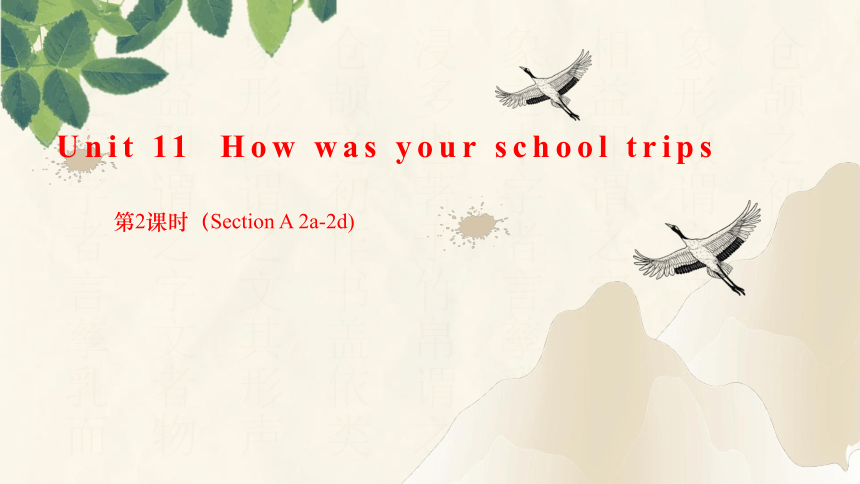 | |
| 格式 | pptx | ||
| 文件大小 | 7.1MB | ||
| 资源类型 | 试卷 | ||
| 版本资源 | 人教新目标(Go for it)版 | ||
| 科目 | 英语 | ||
| 更新时间 | 2024-04-14 11:26:12 | ||
图片预览

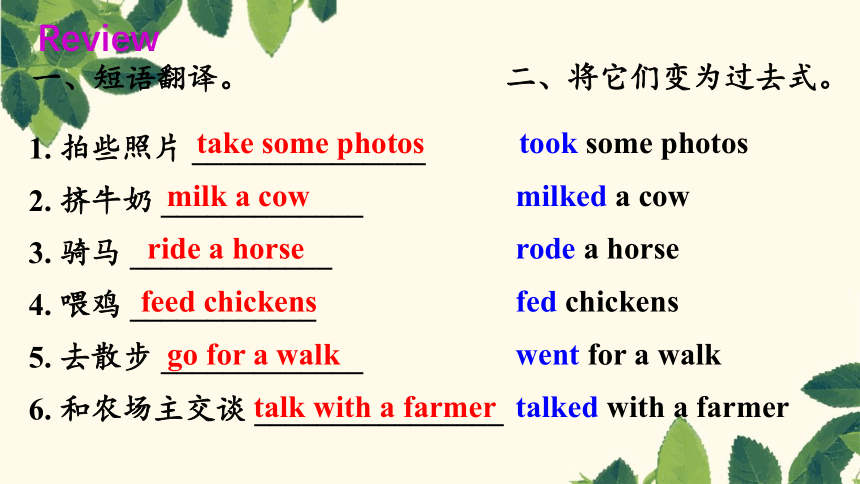
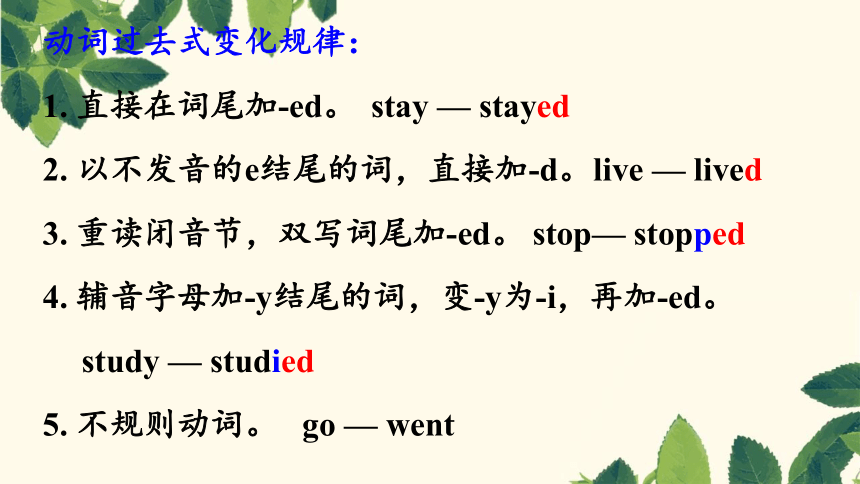
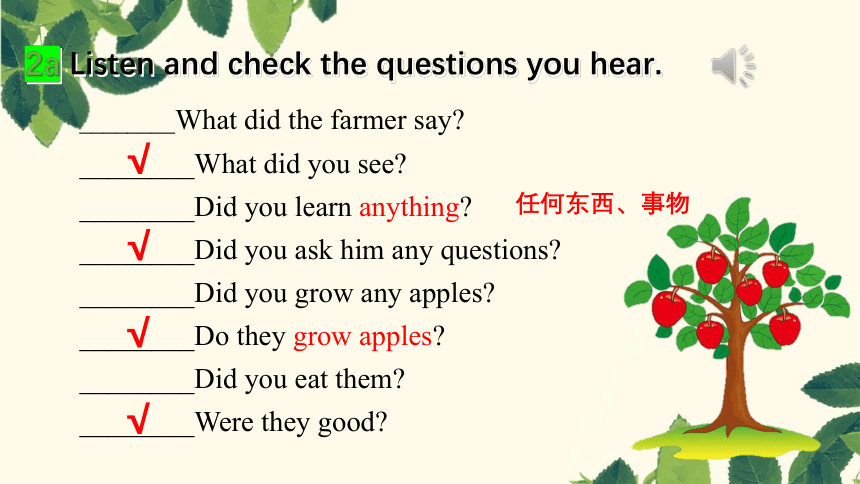

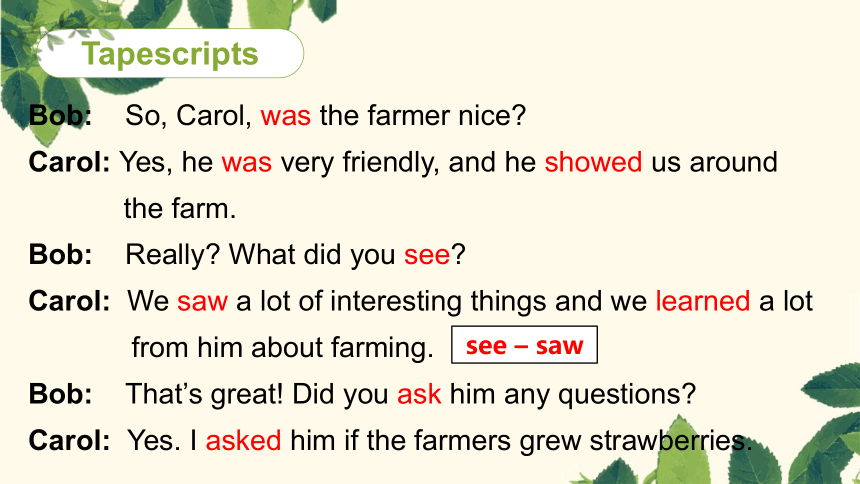
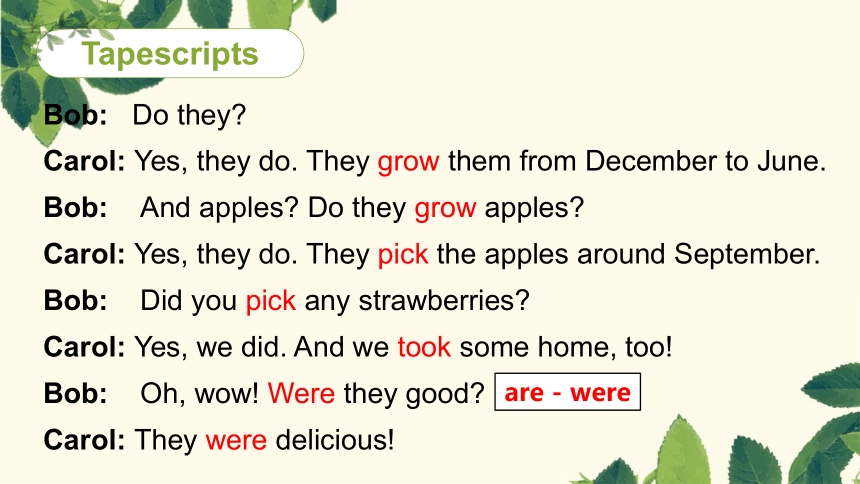
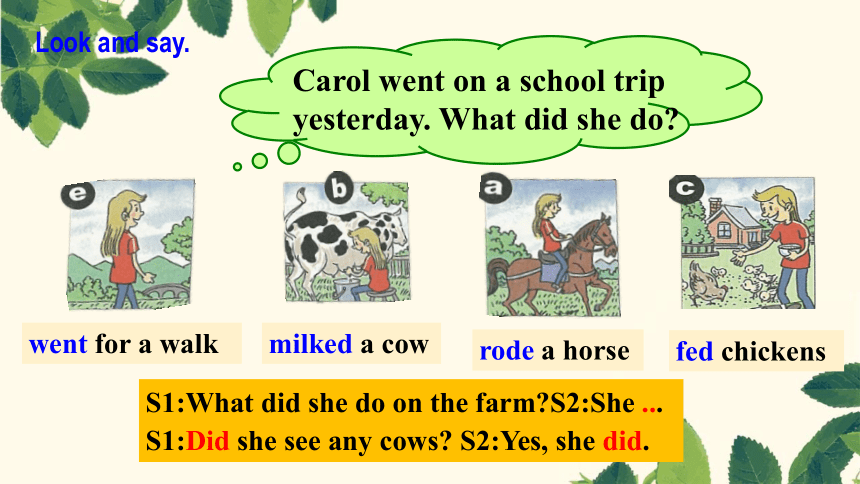
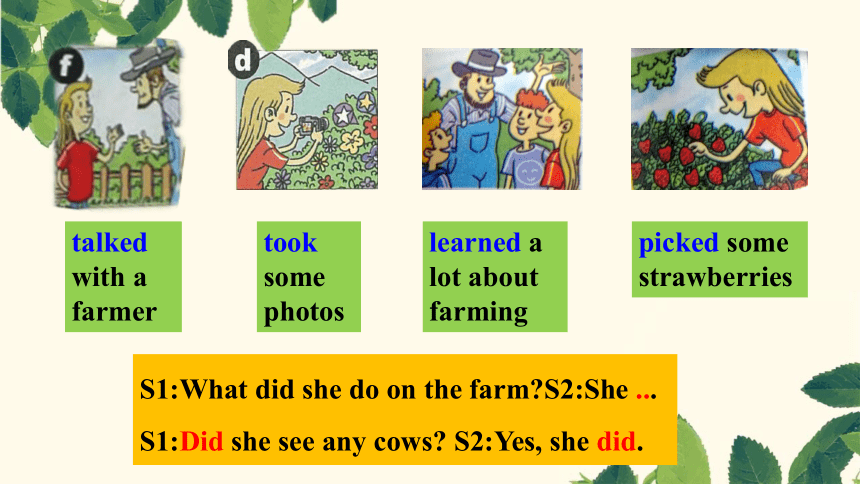
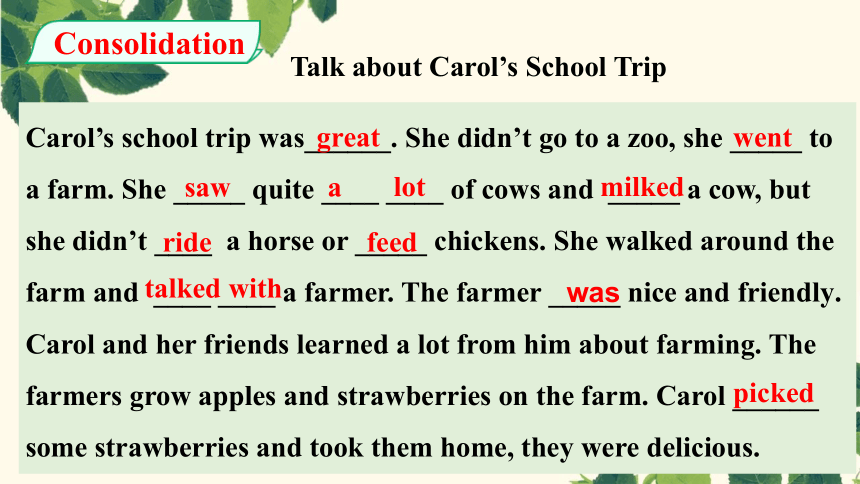
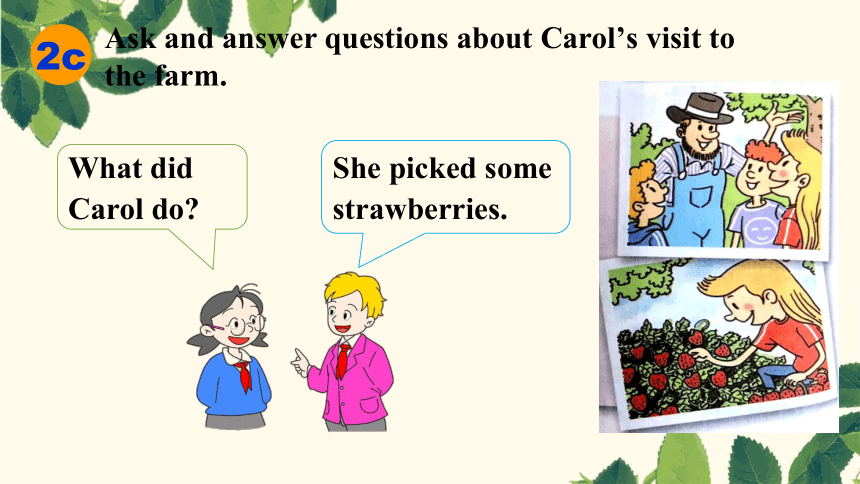
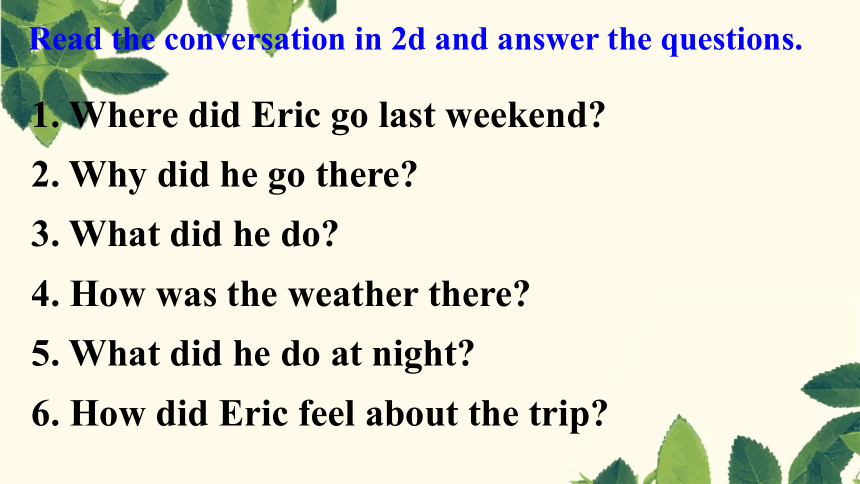
文档简介
(共30张PPT)
仓颉之初作书盖依类象形故谓之文其形声相益即谓之字文者物象之本字者言孳乳而浸多也著于竹帛谓之仓颉之初作书盖依类象形故谓之文其形声相益即谓之字文者物象之本字者言孳乳而
Unit 11 How was your school trips
第2课时(Section A 2a-2d)
Review
一、短语翻译。
1. 拍些照片 _______________
2. 挤牛奶 _____________
3. 骑马 _____________
4. 喂鸡 ____________
5. 去散步 _____________
6. 和农场主交谈 ________________
took some photos
milked a cow
rode a horse
fed chickens
went for a walk
talked with a farmer
take some photos
milk a cow
ride a horse
feed chickens
go for a walk
talk with a farmer
二、将它们变为过去式。
1. 直接在词尾加-ed。
3. 重读闭音节,双写词尾加-ed。
动词过去式变化规律:
2. 以不发音的e结尾的词,直接加-d。
4. 辅音字母加-y结尾的词,变-y为-i,再加-ed。
5. 不规则动词。
stay — stayed
live — lived
stop— stopped
study — studied
go — went
2a Listen and check the questions you hear.
________What did the farmer say
________What did you see
________Did you learn anything
________Did you ask him any questions
________Did you grow any apples
________Do they grow apples
________Did you eat them
________Were they good
√
√
√
√
任何东西、事物
2b Listen again.Circle T for true or F for false.
1.The farmer showed Carol around the farm. T F
2.Carol learned a lot about farming. T F
3.The farmers grow strawberries from December to June. T F
4.The farmers don't grow apples. T F
5.Carol picked some strawberries and took them home. T F
show sb. around 带某人四处转转
learn about… 了解…
take…home 带…回家
采摘
种草莓
Bob: So, Carol, was the farmer nice
Carol: Yes, he was very friendly, and he showed us around
the farm.
Bob: Really What did you see
Carol: We saw a lot of interesting things and we learned a lot
from him about farming.
Bob: That’s great! Did you ask him any questions
Carol: Yes. I asked him if the farmers grew strawberries.
Tapescripts
see – saw
Bob: Do they
Carol: Yes, they do. They grow them from December to June.
Bob: And apples Do they grow apples
Carol: Yes, they do. They pick the apples around September.
Bob: Did you pick any strawberries
Carol: Yes, we did. And we took some home, too!
Bob: Oh, wow! Were they good
Carol: They were delicious!
Tapescripts
are - were
Carol went on a school trip yesterday. What did she do
went for a walk
milked a cow
rode a horse
fed chickens
S1:What did she do on the farm S2:She ...
S1:Did she see any cows S2:Yes, she did.
Look and say.
talked with a farmer
took some photos
learned a lot about farming
picked some strawberries
S1:What did she do on the farm S2:She ...
S1:Did she see any cows S2:Yes, she did.
Consolidation
Talk about Carol’s School Trip
Carol’s school trip was______. She didn’t go to a zoo, she _____ to a farm. She _____ quite ____ ____ of cows and _____ a cow, but she didn’t ____ a horse or _____ chickens. She walked around the farm and ____ ____ a farmer. The farmer _____ nice and friendly. Carol and her friends learned a lot from him about farming. The farmers grow apples and strawberries on the farm. Carol ______ some strawberries and took them home, they were delicious.
great
went
saw
a
lot
milked
ride
feed
talked with
picked
was
Ask and answer questions about Carol’s visit to the farm.
She picked some strawberries.
What did Carol do
2c
Read the conversation in 2d and answer the questions.
1. Where did Eric go last weekend
2. Why did he go there
3. What did he do
4. How was the weather there
5. What did he do at night
6. How did Eric feel about the trip
1. Where did Eric go last weekend
2. Why did he go there
3. What did he do
4. How was the weather there
5. What did he do at night
6. How did Eric feel about the trip
He went to the countryside.
He visited his grandparents.
He went fishing and fed the chickens.
It was great and the air was so clean.
He watched the stars.
It was excellent.
Role-play the conversation.
Peter: Hi, Eric. How wasyour tri p last week
Eric: It was excellent. I visited my grandparents in the
countryside.
Peter: Oh, nice. What did you do
Eric: I went fishing every day. And I fed the chickens with my
grandpa. It was so much fun.
Peter: Sounds good. How was the weather there
Eric: It was great, and the air was so clean. I watched the stars
at night. They were so beautiful.
Peter: Lucky you.
2d
Fill in the blank according to 2d.
Peter: Hi, Eric. ________ was your trip last week
Eric: It was __________. I visited my grandparents in
the ____________.
Peter: Oh, nice. What ________ you do
Eric: I ________ fishing every day. And I ______ the
chickens with my grandpa. It ____ so much fun.
Peter: _________ good. How was the weather there
Eric: It was great and the air was so ______. I watched
the stars at night. They were so beautiful.
Peter: ________ you.
How
excellent
country(side)
did
went
fed
was
Sounds
clean
Lucky
行业PPT模板http://www./hangye/
Make a survey. Ask your partners what they did last week. Then give a report.
A: Hi, Mike. What did you do last weekend
B: I watched TV, and then I went fishing with my father.
A: How was your last weekend
B: It was boring.
Names Activities she/he did How was his/
her weekend / feeling
Mike boring/terrible
Peter busy/tired/bad
Eric good/wonderful/
fantastic
Language points
1. The farmer showed Carol around the farm.
show sb. around sth. 带领某人参观……
show作及物动词:
①意为“给…看;出示;显示”,常构成show sb. sth. 或show sth. to sb. 结构。
Please show me that photo. =Please show that photo to me. 请把那张照片拿给我看看。
②意为“(向人)说明;表明;指示;放映;展出”。
Your homework shows that you are very careful. 从你的作业上可以看出你很认真。
show sb. sth. = show sth. to sb. 将某物给某人看
show up 出现,露面
show off 炫耀
Please show me your passport. 请把你的驾照给我看看。
A strange man showe up at the end of the party.在聚会的最后,一个奇怪的男人出现了。
2. Carol learned a lot about farming.
1)learn about… 学习/ 了解关于……
learn about 了解/知道/获悉,相当于know about。
I’d like to learn more about computers.我想学习更多关于电脑的知识。
How did you learn / know about the meeting 你是怎么知道会议的情况的?
2)farm
n. 农场 on the farm 在农场上
v. 耕种;干农活 It is still too cold for farming. 天气还是太冷,不适合农耕。
【拓展】
farmingn. 农事;耕作 He is farming there.他正在那儿干农活。
farmer n. 农民;农场主 The farmer is farming on a farm.这位农民正在农场干活。
3. How was your trip last week 本句为询问某事情况的常用句型。
1)How + be… 意为“……怎么样?”可与“What be … like ”互换。
How was your summer vacation = What was your summer vacation like
你的暑假过得怎样?
常用答语:It was great. 好极了。It was OK. 还可以。
It wasn’t good. 不好。It was not bad. 还不错。
2)trip名词,意为“郊游;旅行”,通常指近距离、某次具体的旅行。
Have a good trip! 旅途愉快!
【拓展】你认为...怎么样?
What do you think of ... =How is ... =What is ... like
今天天气怎么样?How is the weather today /What is the weather like today
昨天天气怎么样?How was the weather yesterday /What was the weather like yesterday
4. It was excellent.
excellent “极好的;优秀的”,相当于very good。通常用于肯定句,不用于否定句或疑问句。
The food is excellent here. 这里的食物很好。
be excellent in 在...方面极好
He is excellent in math. 他的数学非常好。
5. It was great, and the air was so clean.
clean 形容词,意为“干净的;清洁的”。反义词:dirty 脏的
clean 作动词,意为“打扫;把……弄干净”。
常用短语:
clean out 把...打扫干净 clean up 收拾干净;清理
6.Did you learn anything anything pron. 任何事情
①(在否定或疑问句中或if条件句中) 代替something
Do you know anything about COVID-19
If you remember anything, please let me know.
②(肯定句中) 随便哪个东西;随便什么事物
I want something to drink and anything is OK.
Anything is possible.
【拓展】
①形容词修饰anything放在其后:anything + adj. Did you hear anything interesting
②在表请求、建议等希望得到肯定回答的疑问句中不用anything,而要用something。
Would you like something to eat
③anything 作主语视作单数 Anything in the room is his.
7.Did you grow any apples
grow此处用作及物动词,意为“种植;栽培”,其后可直接接名词或代词作宾语。
We grow flowers and vegetables in our garden.我们在花园里种植鲜花和蔬菜。
【拓展】
(1)grow可用作不及物动词,意为“生长;发育”。
In spring, everything begins to grow.春天万物复苏。
How quickly the baby is growing!这个婴儿长得多么快啊!
(2)grow可用作连系动词,有“逐渐变得”之意,强调变化过程。
It's growing dark.天渐渐(变)黑了。
(3)grow up意为“长大;成长”。
What do you want to be when you grow up 你长大后想当什么?
8.Carol picked some strawberries and took them home.
pick v. ① 采,摘;② 挑选;③ 剔除
Don’t pick flowers in the garden. 不要摘花园里的花。
Pick out a number from one to five. 从1到5选出个数字。
He picks the nuts from the cake. 他从蛋糕里挑出坚果。
pick apples / flowers 摘苹果、摘花
pick one’s nose 抠鼻子
pick one’s teeth 剔牙齿
pick out ①挑选出来 ②辨认出…
pick up ①捡起 ②接电话
③(开车)接某人 ④学会… ⑤感染(疾病)
9.It was so much fun.
1)so much意为“如此多;这么多”,一般用于修饰不可数名词或动词。
There was so much noise in the classroom.教室里太吵了。
【拓展】so many “这么多;如此多”,常用来修饰可数名词复数。
He had so many friends in the city.在这个城市里,他有这么多朋友。
2)fun此处用作不可数名词,意为“乐趣;开心;有趣的人或事”,其前常用great,much,a lot of等修饰,用来加强语气。
He's great fun, and his dog is great fun, too. 他是个有趣的人,他的狗也很有趣。
Skating is great fun. 滑冰是件很有趣的事。
【拓展】have (great) fun 玩得开心
have great fun doing sth. 做某事玩得开心
Look, Peter. The children are having so much fun. 看,皮特,孩子们玩的多开心。
10.I visited my grandparents in the countryside.
我去看望了乡下的爷爷奶奶。
a) visit 表示“拜访,看望,参观”,后面宾语可以是人,也可以是地点名词。
visit my teacher = call on my teacher
visit your school = call at your school
b) in the countryside 在乡下
countryside在此处等同于country,都是“乡下,农村”之意,往往和冠词 “the” 搭配连用。
We spent a pleasant day in the country.
我们在乡下度过了愉快的一天。
一、选择题
1. I went to Beijing to my grandparents last week, and they showed me around the city.
A. visit B. visited C. see D. seen
2. He had no money last week, so he buy anything .
A. does B. didn't C. doesn't D. don't
3. ---How ____ your weekend
--- It ____ great.
A. was; did B. was; was C. is; is D.was,is
4.--Did you eat____ in the morning
--No,I didn’t eat _____.
A. something, anything B. anything, anything
C. something ,something D.anything, something
A
B
B
B
二.按要求完成句子。
Let me ________ ________ ________(带领你参观)the city.
Carol ________ ________ (去钓鱼)every Sunday last summer.
My trip was great yesterday.(对画线部分提问)
________ ________ your trip yesterday
4. 乡下的空气很清新。
The air is so clean ___ ____ ____________.
5. 在那里我学习了很多关于农业的知识。
I _______ ______ a lot ______ ________ there.
show you around
went fishing
How was
in the countryside
learned quite about farming
仓颉之初作书盖依类象形故谓之文其形声相益即谓之字文者物象之本字者言孳乳而浸多也著于竹帛谓之仓颉之初作书盖依类象形故谓之文其形声相益即谓之字文者物象之本字者言孳乳而
谢君一赏
仓颉之初作书盖依类象形故谓之文其形声相益即谓之字文者物象之本字者言孳乳而浸多也著于竹帛谓之仓颉之初作书盖依类象形故谓之文其形声相益即谓之字文者物象之本字者言孳乳而
Unit 11 How was your school trips
第2课时(Section A 2a-2d)
Review
一、短语翻译。
1. 拍些照片 _______________
2. 挤牛奶 _____________
3. 骑马 _____________
4. 喂鸡 ____________
5. 去散步 _____________
6. 和农场主交谈 ________________
took some photos
milked a cow
rode a horse
fed chickens
went for a walk
talked with a farmer
take some photos
milk a cow
ride a horse
feed chickens
go for a walk
talk with a farmer
二、将它们变为过去式。
1. 直接在词尾加-ed。
3. 重读闭音节,双写词尾加-ed。
动词过去式变化规律:
2. 以不发音的e结尾的词,直接加-d。
4. 辅音字母加-y结尾的词,变-y为-i,再加-ed。
5. 不规则动词。
stay — stayed
live — lived
stop— stopped
study — studied
go — went
2a Listen and check the questions you hear.
________What did the farmer say
________What did you see
________Did you learn anything
________Did you ask him any questions
________Did you grow any apples
________Do they grow apples
________Did you eat them
________Were they good
√
√
√
√
任何东西、事物
2b Listen again.Circle T for true or F for false.
1.The farmer showed Carol around the farm. T F
2.Carol learned a lot about farming. T F
3.The farmers grow strawberries from December to June. T F
4.The farmers don't grow apples. T F
5.Carol picked some strawberries and took them home. T F
show sb. around 带某人四处转转
learn about… 了解…
take…home 带…回家
采摘
种草莓
Bob: So, Carol, was the farmer nice
Carol: Yes, he was very friendly, and he showed us around
the farm.
Bob: Really What did you see
Carol: We saw a lot of interesting things and we learned a lot
from him about farming.
Bob: That’s great! Did you ask him any questions
Carol: Yes. I asked him if the farmers grew strawberries.
Tapescripts
see – saw
Bob: Do they
Carol: Yes, they do. They grow them from December to June.
Bob: And apples Do they grow apples
Carol: Yes, they do. They pick the apples around September.
Bob: Did you pick any strawberries
Carol: Yes, we did. And we took some home, too!
Bob: Oh, wow! Were they good
Carol: They were delicious!
Tapescripts
are - were
Carol went on a school trip yesterday. What did she do
went for a walk
milked a cow
rode a horse
fed chickens
S1:What did she do on the farm S2:She ...
S1:Did she see any cows S2:Yes, she did.
Look and say.
talked with a farmer
took some photos
learned a lot about farming
picked some strawberries
S1:What did she do on the farm S2:She ...
S1:Did she see any cows S2:Yes, she did.
Consolidation
Talk about Carol’s School Trip
Carol’s school trip was______. She didn’t go to a zoo, she _____ to a farm. She _____ quite ____ ____ of cows and _____ a cow, but she didn’t ____ a horse or _____ chickens. She walked around the farm and ____ ____ a farmer. The farmer _____ nice and friendly. Carol and her friends learned a lot from him about farming. The farmers grow apples and strawberries on the farm. Carol ______ some strawberries and took them home, they were delicious.
great
went
saw
a
lot
milked
ride
feed
talked with
picked
was
Ask and answer questions about Carol’s visit to the farm.
She picked some strawberries.
What did Carol do
2c
Read the conversation in 2d and answer the questions.
1. Where did Eric go last weekend
2. Why did he go there
3. What did he do
4. How was the weather there
5. What did he do at night
6. How did Eric feel about the trip
1. Where did Eric go last weekend
2. Why did he go there
3. What did he do
4. How was the weather there
5. What did he do at night
6. How did Eric feel about the trip
He went to the countryside.
He visited his grandparents.
He went fishing and fed the chickens.
It was great and the air was so clean.
He watched the stars.
It was excellent.
Role-play the conversation.
Peter: Hi, Eric. How wasyour tri p last week
Eric: It was excellent. I visited my grandparents in the
countryside.
Peter: Oh, nice. What did you do
Eric: I went fishing every day. And I fed the chickens with my
grandpa. It was so much fun.
Peter: Sounds good. How was the weather there
Eric: It was great, and the air was so clean. I watched the stars
at night. They were so beautiful.
Peter: Lucky you.
2d
Fill in the blank according to 2d.
Peter: Hi, Eric. ________ was your trip last week
Eric: It was __________. I visited my grandparents in
the ____________.
Peter: Oh, nice. What ________ you do
Eric: I ________ fishing every day. And I ______ the
chickens with my grandpa. It ____ so much fun.
Peter: _________ good. How was the weather there
Eric: It was great and the air was so ______. I watched
the stars at night. They were so beautiful.
Peter: ________ you.
How
excellent
country(side)
did
went
fed
was
Sounds
clean
Lucky
行业PPT模板http://www./hangye/
Make a survey. Ask your partners what they did last week. Then give a report.
A: Hi, Mike. What did you do last weekend
B: I watched TV, and then I went fishing with my father.
A: How was your last weekend
B: It was boring.
Names Activities she/he did How was his/
her weekend / feeling
Mike boring/terrible
Peter busy/tired/bad
Eric good/wonderful/
fantastic
Language points
1. The farmer showed Carol around the farm.
show sb. around sth. 带领某人参观……
show作及物动词:
①意为“给…看;出示;显示”,常构成show sb. sth. 或show sth. to sb. 结构。
Please show me that photo. =Please show that photo to me. 请把那张照片拿给我看看。
②意为“(向人)说明;表明;指示;放映;展出”。
Your homework shows that you are very careful. 从你的作业上可以看出你很认真。
show sb. sth. = show sth. to sb. 将某物给某人看
show up 出现,露面
show off 炫耀
Please show me your passport. 请把你的驾照给我看看。
A strange man showe up at the end of the party.在聚会的最后,一个奇怪的男人出现了。
2. Carol learned a lot about farming.
1)learn about… 学习/ 了解关于……
learn about 了解/知道/获悉,相当于know about。
I’d like to learn more about computers.我想学习更多关于电脑的知识。
How did you learn / know about the meeting 你是怎么知道会议的情况的?
2)farm
n. 农场 on the farm 在农场上
v. 耕种;干农活 It is still too cold for farming. 天气还是太冷,不适合农耕。
【拓展】
farmingn. 农事;耕作 He is farming there.他正在那儿干农活。
farmer n. 农民;农场主 The farmer is farming on a farm.这位农民正在农场干活。
3. How was your trip last week 本句为询问某事情况的常用句型。
1)How + be… 意为“……怎么样?”可与“What be … like ”互换。
How was your summer vacation = What was your summer vacation like
你的暑假过得怎样?
常用答语:It was great. 好极了。It was OK. 还可以。
It wasn’t good. 不好。It was not bad. 还不错。
2)trip名词,意为“郊游;旅行”,通常指近距离、某次具体的旅行。
Have a good trip! 旅途愉快!
【拓展】你认为...怎么样?
What do you think of ... =How is ... =What is ... like
今天天气怎么样?How is the weather today /What is the weather like today
昨天天气怎么样?How was the weather yesterday /What was the weather like yesterday
4. It was excellent.
excellent “极好的;优秀的”,相当于very good。通常用于肯定句,不用于否定句或疑问句。
The food is excellent here. 这里的食物很好。
be excellent in 在...方面极好
He is excellent in math. 他的数学非常好。
5. It was great, and the air was so clean.
clean 形容词,意为“干净的;清洁的”。反义词:dirty 脏的
clean 作动词,意为“打扫;把……弄干净”。
常用短语:
clean out 把...打扫干净 clean up 收拾干净;清理
6.Did you learn anything anything pron. 任何事情
①(在否定或疑问句中或if条件句中) 代替something
Do you know anything about COVID-19
If you remember anything, please let me know.
②(肯定句中) 随便哪个东西;随便什么事物
I want something to drink and anything is OK.
Anything is possible.
【拓展】
①形容词修饰anything放在其后:anything + adj. Did you hear anything interesting
②在表请求、建议等希望得到肯定回答的疑问句中不用anything,而要用something。
Would you like something to eat
③anything 作主语视作单数 Anything in the room is his.
7.Did you grow any apples
grow此处用作及物动词,意为“种植;栽培”,其后可直接接名词或代词作宾语。
We grow flowers and vegetables in our garden.我们在花园里种植鲜花和蔬菜。
【拓展】
(1)grow可用作不及物动词,意为“生长;发育”。
In spring, everything begins to grow.春天万物复苏。
How quickly the baby is growing!这个婴儿长得多么快啊!
(2)grow可用作连系动词,有“逐渐变得”之意,强调变化过程。
It's growing dark.天渐渐(变)黑了。
(3)grow up意为“长大;成长”。
What do you want to be when you grow up 你长大后想当什么?
8.Carol picked some strawberries and took them home.
pick v. ① 采,摘;② 挑选;③ 剔除
Don’t pick flowers in the garden. 不要摘花园里的花。
Pick out a number from one to five. 从1到5选出个数字。
He picks the nuts from the cake. 他从蛋糕里挑出坚果。
pick apples / flowers 摘苹果、摘花
pick one’s nose 抠鼻子
pick one’s teeth 剔牙齿
pick out ①挑选出来 ②辨认出…
pick up ①捡起 ②接电话
③(开车)接某人 ④学会… ⑤感染(疾病)
9.It was so much fun.
1)so much意为“如此多;这么多”,一般用于修饰不可数名词或动词。
There was so much noise in the classroom.教室里太吵了。
【拓展】so many “这么多;如此多”,常用来修饰可数名词复数。
He had so many friends in the city.在这个城市里,他有这么多朋友。
2)fun此处用作不可数名词,意为“乐趣;开心;有趣的人或事”,其前常用great,much,a lot of等修饰,用来加强语气。
He's great fun, and his dog is great fun, too. 他是个有趣的人,他的狗也很有趣。
Skating is great fun. 滑冰是件很有趣的事。
【拓展】have (great) fun 玩得开心
have great fun doing sth. 做某事玩得开心
Look, Peter. The children are having so much fun. 看,皮特,孩子们玩的多开心。
10.I visited my grandparents in the countryside.
我去看望了乡下的爷爷奶奶。
a) visit 表示“拜访,看望,参观”,后面宾语可以是人,也可以是地点名词。
visit my teacher = call on my teacher
visit your school = call at your school
b) in the countryside 在乡下
countryside在此处等同于country,都是“乡下,农村”之意,往往和冠词 “the” 搭配连用。
We spent a pleasant day in the country.
我们在乡下度过了愉快的一天。
一、选择题
1. I went to Beijing to my grandparents last week, and they showed me around the city.
A. visit B. visited C. see D. seen
2. He had no money last week, so he buy anything .
A. does B. didn't C. doesn't D. don't
3. ---How ____ your weekend
--- It ____ great.
A. was; did B. was; was C. is; is D.was,is
4.--Did you eat____ in the morning
--No,I didn’t eat _____.
A. something, anything B. anything, anything
C. something ,something D.anything, something
A
B
B
B
二.按要求完成句子。
Let me ________ ________ ________(带领你参观)the city.
Carol ________ ________ (去钓鱼)every Sunday last summer.
My trip was great yesterday.(对画线部分提问)
________ ________ your trip yesterday
4. 乡下的空气很清新。
The air is so clean ___ ____ ____________.
5. 在那里我学习了很多关于农业的知识。
I _______ ______ a lot ______ ________ there.
show you around
went fishing
How was
in the countryside
learned quite about farming
仓颉之初作书盖依类象形故谓之文其形声相益即谓之字文者物象之本字者言孳乳而浸多也著于竹帛谓之仓颉之初作书盖依类象形故谓之文其形声相益即谓之字文者物象之本字者言孳乳而
谢君一赏
同课章节目录
- Unit 1 Can you play the guitar?
- Section A
- Section B
- Unit 2 What time do you go to school?
- Section A
- Section B
- Unit 3 How do you get to school?
- Section A
- Section B
- Unit 4 Don't eat in class.
- Section A
- Section B
- Unit 5 Why do you like pandas?
- Section A
- Section B
- Unit 6 I'm watching TV.
- Section A
- Section B
- Review of Units 1-6
- Unit 7 It's raining!
- Section A
- Section B
- Unit 8 Is there a post office near here?
- Section A
- Section B
- Unit 9 What does he look like?
- Section A
- Section B
- Unit 10 I'd like some noodles.
- Section A
- Section B
- Unit 11 How was your school trip?
- Section A
- Section B
- Unit 12 What did you do last weekend?
- Section A
- Section B
